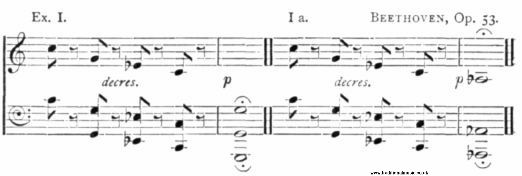MUSICAL MEMORY - online book
A System To Cultivate The Musical Memory For Musicians.
| Share page | Visit Us On FB |
|
4 |
MUSICAL MEMORY. |
||
|
alike for its intelligent hearing an exercise of musical memory, although in immensely different degrees.
7. A study of the Sonata-form movements of Beethoven, and a comparison of the " first portion " with the " recapitulation " will show us how in the latter (which in earlier composers was mere repetition), the composer delighted to introduce- surprises of every description, which, however, can only be fully appreciated and understood by the retentive listener. The following bars from the " Waldstein " Sonata will instantly occur to the mind of many pianists, where the last note in Ex. la at first almost appears to have the character of a wrong note until the insistence of the passage in this form in the following bars, banishes such an impression and reveals the substitution of A flat for G at such a striking point as being one of the composer's bold and daring methods of arresting the attention, and sustaining the interest of the listener. But for one who has retained no idea of the first version of the passage (Ex. I) the second version can have no such revelation, and therefore far less meaning. |
|||
 |
|||
|
Another exceptionally fine instance, where Beethoven seems to have set himself to shock his pedantic listeners, quite as much as to mystify the unpedantic ones, may be seen in the Sonata in D minor, Op. 31, No. 2, if the opening of the first movement is compared with the beginning of the recapitulation. Not merely, however, in listening to movements in which there is repetition of previous material do we have to exercise our memory, but works which are evolved from one theme—such as Fugues, sets of Variations, and some modern Rhapsodies—lose all their significance and meaning, unless we can frequently compare the present with the past j while in Opera and Oratorio, the kit motiv is a device which appeals to the same power. The intelligent listener must be constantly employing his memory even when hearing works of simple and obvious construction, while for the understanding of compositions of greater calibre and deeper meaning, a severe effort of memory is-often absolutely necessary.
8. Musical Memory employed for Permanent Acquisition.— From a consideration of the transitory memory necessary to the listener, |
|||
|
we |
will now pass and proceed to trace briefly the development of |
||
|
|
|||
|
musical memory for the purpose of permanent acquisition. The early growth of musical memory becomes manifest when a child, whose interest has been aroused by the hearing of some pretty tune, will |
|||